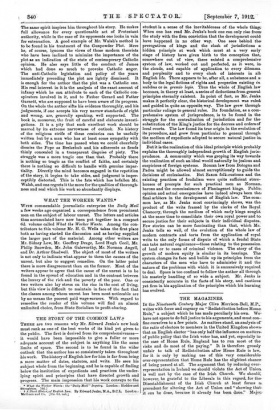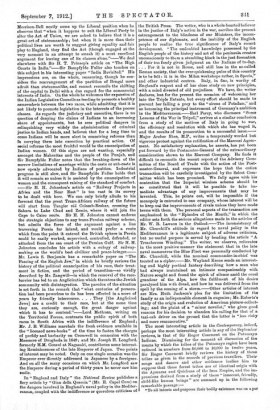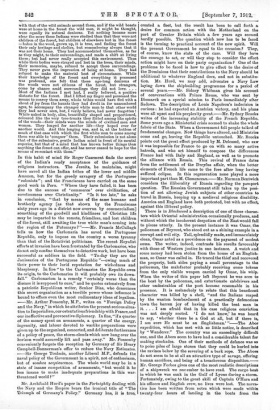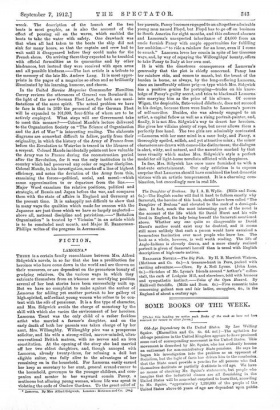THE MAGAZINES.
IN the Nineteenth Century Major Clive Morrison-Bell, M.P., writes with force and cogency on "Redistribution before Home, Rule," a subject which he has made peculiarly his own. We- have not space to do fall justice to his arguments, and must con- fine ourselves to a few points. As matters stand, an analysis of the ratio of electors to members in the United Kingdom shown: that an English elector "has only half the influence on matters-
of public policy that the Irish voter has, and yet, especially in the case of Home Rule, England has to run most of the
risks and do most of the paying." It is therefore grossly unfair to talk of Redistribution after Home Rule is law, for it is only by making use of this very considerable over-representation that Home Rule has the slightest chance• of being passed at all. The argument that by reducing over- representation in Ireland we should violate the Act of Union is well met by the case of the Irish Church. We should; however, be grateful to the Liberals in this regard, for the- Disestablishment of the Irish Church at least forms tte. precedent for altering the Act of Union and "showing that- it can he done, because it already has been done." Major: Morrison-Bell neatly sums up the Liberal position when he observes that "when it happens to snit the Liberal Party to alter the Act of Union, we are asked to believe that it is a great act of statesmanship ; but when it is more than their political lives are worth to suggest giving equality and fair play to England, they find the Act (though engaged at the very moment in an attempt to smash it) a most excellent argument for leaving one of its clauses alone."—We deal elsewhere with Sir H. T. Prinsep's article on "The High Courts in India."—Sir Bampfylde Fuller also touches on this subject in his interesting paper "India Revisited." His impressions are, on the whole, reassuring, though he con- siders the rearrangement of the partition of Bengal more adroit than statesmanlike, and cannot reconcile the shifting of the capital to Delhi with a due regard for the commercial interests of India. On the whole he welcomes the expansion of the Indian Legislative Councils as tending to promote a healthy camaraderie between the two races, while admitting that it is not likely to promote legislation in the interests of the poorer classes. As regards the judiciary and executive, there is no question of denying the claims of Indians to an increasing share of appointments, but he sees political dangers in relinquishing very widely the administration of criminal justice to Indian hands, and believe; that for a long time to come Indians will be more alert in conceiving reforms than hi carrying them into execution by practical action. Of social reforms the most fruitful would be the emancipation of Indian women. Of this signs are not wanting, especially amongst the Mahrattas and the people of the Punjab, and Sir Bampfylde Fuller notes that the breaking-down of the narrow limitations of marriage within the caste or sub-caste is now openly advocated by Indians of position. Industrial progress is still slow, and Sir Bampfylde Fuller holds that it will remain so unless it is assisted by the emancipation of women and the consequent raising of the standard of comfort. —Sir R H. Johnston's article on "Railway Projects in Africa and the Near East" is too vast in its survey to be dealt with here. We can only briefly allude to his forecast that the great Trans-African railway of the future will start from Tangier rid, Colomb-Beshar, crossing the Sahara to Lake Chad and Zemio, where it will join the Cape to Cairo route. Sir H. H. Johnston cannot endorse the strategic objections to any trans-Persian railway scheme, but admits the force of the argument against a line traversing Persia far inland, and would prefer a route which from the point it entered the British sphere in Persia could be easily worked, supervised, controlled, defended, or attacked from the sea coast of the Persian Gulf. Sir H. H. Johnston concludes his article with a eulogy of railway- making as the world's best civilizer and peace-bringer.- Mr. Lewis S. Benjamin has a remarkable paper on " The Passing of the English Jew," in which he briefly reviews the history of the political emancipation of his race, their treat- ment in fiction, and the period of transition—so vividly described by Mr. Zangwill—in which the removal of the race- barrier has led to an Anglicization which threatens the Jewish community with disintegration. The parodox of the situation is set forth in the remark that "what centuries of persecu- tion had been powerless to do has been effected in a score of years by friendly intercourse. . . . They [the Anglicized Jews] are a credit to their race, but at the same time they are, curiously enough, the great danger against which it has to contend."—Lord Methuen, writing on the Territorial Forces, contrasts the public spirit of both races in South Africa with the indifference of England; Mr. J. B. Williams marshals the fresh evidence available in the "licensed news-books" of the time to fasten the charges of perfidy and barbarity on Cromwell in connexion with the Massacre of Drogheda in 1649; and Mr. Joseph H. Longford, formerly H.M. Consul at Nagasaki, contributes some interest- ing Reminiscences of the late Emperor of Japan. Two points of interest may be noted. Only on one single occasion was the Emperor ever directly addressed in Japanese by a foreigner. And on all the many occasions on which Mr. Longford saw the Emperor during a period of thirty years he never saw him smile.
In " England and Italy " the National Review publishes a fiery article by " Gian della Quercia " (Mr. E. Capel Cure) on the dangers involved in England's naval policy in the Mediter- ranean, coupled with the indifference or querulous criticism of the British Press. The writer, who is a whole-hearted believer in the justice of Italy's action in the war, ascribes the present estrangement to the blindness of our Miuisters, the incom- petence of our diplomats, and the inability of the English people to realize the true significance of Italy's recent development. " The undoubted knowledge possessed by the English people of the history and art of the peninsula creates unconsciously to them a stumbling block in the just formation of their too freely given judgment on the Italians of to-day. . . . For it is not in Rome, and still less in the so-called Roman society, that the ever-quickening pulse of this country' is to he felt: it is in the Milan workshops rather, in Spezia," and other industrial centres. Italy, in fine, is worthy of England's respect and of her close study on new principles, with a mind divested of old prejudices. We have, the writer declares, lost for the present the occasion of welcoming her into the Triple Entente, but every effort should be made to prevent her falling a prey to the " sirens of Potsdam," and so becoming the principal instrument of Germany's ambition in the Mediterranean.—Earl Percy, who discusses " Some Lessons of the War in Tripoli," arrives at a similar conclusion from a study of the motives of Italy in going to war, the efficiency and resolution with which she has waged it, and the results of its prosecution to a successful issue.— Major Archer Shee, M.P., writes a temperately worded but vigorous protest against the ratification of the Marconi Agree- ment. No satisfactory explanation, he asserts, has yet been put forward by the Postmaster-General of the extraordinary consideration shown to the Marconi Company. He finds it difficult to reconcile the recent report of the Advisory Com- mittee of the Board of Trade with the action of the Post- master-General, and expresses the hope that the entire transaction will be carefully investigated by the Select Com- mittee which has been promised. We fully agree with his contention that the Imperial wireless scheme should be so constituted that it will be possible to take im- mediate advantage of any improvements that may be invented. This, he points out, will be impossible if the monopoly is entrusted to one company, whose interest will be to keep out the improvements of rivals unless they have made terms with them. The personal aspects of the transaction are emphasized in the " Episodes of the Month," in which the editor sets forth the serious allegations made in the articles of Mr. W. R. Lawson in the Outlook.—The inconsistency of Mr. Churchill's attitude in regard to naval policy in the Mediterranean is a legitimate subject of adverse criticism, but no useful purpose is served by heading the article "A Treacherous Windbag." The writer, we observe, reiterates in the most positive manner the statement that in the late naval manoeuvres the Blue Fleet was personally conducted by Mr. Churchill, while the nominal commander-in-chief was treated as a, cipher.—Mr. Wayland Keene sends an interest- ing and highly poetical fantasy describing how a man who had always maintained an intimate companionship with Nature sought and found the spirit of silence amid the cruel grandeur of the Alps, how the fulfilment of his desire paralysed him with dread, and how he was delivered from the spell by the coming of a storm.—Other articles of interest are Mrs. Huth Jackson's plea for the limitation of the family as an indispensable element in eugenics ; Mr. Roberts's study of the origin and evolution of American picture-collect- ing; and the plaint of a "minor novelist," who gives good reasons for his decision to abandon his calling for that of a taxi-cab driver on the ground that the latter is "less risky and more remunerative."
The most interesting article in the Contemporary, indeed, perhaps the most interesting article in any of the September reviews, is that of Sir Roger Casement on the Putuniayo Indians. Dismissing for the moment all discussion of the means by which the tribes of the Putumayo region have been
reduced in numbers from 60,000 to 10,000 in twelve years, Sir Roger Casement briefly reviews the history of these tribes as given in the records of previous travellers. Their songs and dances and other evidences incline him to suppose that these forest tribes are of identical origin with
the Aymaras and Quichuas of the Inca Empire, and the im- pressions derived from a study of these " innocent, friendly, child-like human beings" are summed up in the following remarkable passage :—
" To all intents and purposes their bodily existence was on a par
with that of the wild animals around them, and if the wild beasts were at home in the forest the wild men, it might be thought, were equally its natural denizens. Yet nothing became more clear the more these Indians were studied than that they were not children of the forest, but children of elsewhere lost in the forest —babes in the wood, grown up, it is true, and finding the forest their only heritage and shelter, but remembering always that it was not their home. They had accommodated themselves, as far as they might, to their surroundings, and made a shift at living there; but had never really accepted this environment. Thus while their bodies were strayed and lost in the trees, their minds, their memories, maybe, refused to accept these surroundings. They never gave the impression of being at home. They had refused to make the material best of circumstance. While their knowledge of the forest and everything it possessed was profound, one felt that these age-long denizens of the woods were not citizens of the forest, but strangers, come by chance amid surroundings they did not love. . . . Most of the Indians I met had, I really believed, a positive distaste for the forest. Had I lifted my finger and possessed the means to convey them away, whole tribes would have fled with a shout of joy from the haunts they had dwelt in for unnumbered ages, to accompany the stranger white man to that other world they had never seen, but, I verily believe, had never forgotten ! While naked in body, slim, beautifully shaped and proportioned, coloured like the very tree-trunks they flitted among like spirits of tho woods—their minds were the minds of civilized men and women. They longed for another life—they hoped ever for another world. And this longing was, and is, at the bottom of much of that ease with which the first white man to come among them was able to `conquer' them. Their submission is not alone that of the submissive, gentle Indian mind in front of its mental superior, but that of a mind that has known better things than anything the forest can offer, and has never ceased to hope for the means of re-contact with them."
In this habit of mind Sir Roger Casement finds the secret of the Indian's ready acceptance of the guidance of religious instructors. The Jesuits, he maintains, might have saved all the Indian tribes of the lower and middle Amazon, but for the greedy savagery of the Portuguese " colonists " ; and the Franciscans have carried on the same good work in Peru. " Where they have failed, it has been dne to the success of 'commerce' over civilization, of covetousness over Christianity." "Is it too late," he asks in conclusion, " that by means of the same humane and brotherly agency [as that shown by the Franciscans sixty years ago in a district now overrun by commercialism] something of the goodwill and kindliness of Christian life may be imparted to the remote, friendless, and lost children of the forest, still awaiting the true white man's coming into the region of the Putumayo ? "—Mr. Francis McCullagh tells us how the Carbonaria has saved the Portuguese Republic, only to impose on the country a worse tyranny than that of the Rotativist politicians. The recent Royalist efforts at invasion have been frustrated by the Carbonarios, who do not only confine themselves to detective work, but have been successful as soldiers in the field. " To-day they are the Janissaries of the Portuguese Republic "—owing much of their power to their lurid reputation for wickedness and blasphemy. In fine " to the Carbonarios the Republic owes its origin, to the Carbonarios it will probably owe its down-
fall." Carbonarism is a remedy " certainly worse than the disease it is supposed to cure," and he quotes extensively from a patriotic Republican writer, Senhor Dias, who denounces this secret organization as a terrible power whose influence is
bound to efface even the most rudimentary ideas of legalism. —Mr. Arthur Ponsonby, M.P., writes on " Foreign Policy and the Navy," in which he attributes the present serious situa- tion to Imperialism, our ostentatious friendship with France, and
our ineffective and provocative diplomacy. In fine, "if a quarter of the money spent on armaments, a quarter of the energy,
ingenuity, and labour devoted to warlike preparations were given up to the organized, concerted, and deliberate furtherance of a policy of peace, the storm-clouds which now hang over the horizon would assuredly lift and pass away." Mr. Ponsonby conveniently forgets the reception by Germany of Sir Henry Campbell-Bannerman's offer to reduce the Navy Estimates. —Sir George Toulmin, another Liberal M.P., defends the naval policy of the Government in a spirit, not of enthusiasm, but of sombre acquiescence. The whole world may be in a state of insane competition of armaments, "but would it be less insane to make inadequate preparations in this war- threatened world ? "
Mr. Archibald Hurd's paper in the Fortnightly dealing with the Navy and the Empire bears the ironical title of "The
Triumph of Germany's Policy." Germany has, it is true, created a fleet, but the result has been to call forth a desire for common action with the Motherland on the part of Greater Britain which a few years ago seemed hardly possible. The question which now has to be faced is the turning to practical account of the new spirit. Will the present Government be equal to the occasion P They, of course, know the state of the case. Will they have the courage to act, or will they stop to consider the effect action might have on their party organization ? One of the problems to be faced is how to give effect to the desire of the Dominions that their contributions to the Navy should be additional to whatever England does, and not in substitu- tion. Mr. Hurd, we may add, advocates a Navy Law laying down the shipbuilding programme for a period of several years.—Mr. Sidney Whitman gives his account of conversations with Prince Reuss, who was sent by Bismarck on a special mission to Paris immediately after Sadowa. The description of Louis Napoleon's indecision is curious : he had expected an Austrian victory, and his plans were all upset and his perplexity great.—Mr. Sydney Brooks writes of the increasing stability of the French Republic. Some years ago a Ministerial crisis seemed to shake the whole fabric of the State. When a Government fell people talked of fundamental changes. No things have altered, and Ministries come and go, leaving the Republic untouched. Mr. Brooks points out the great effect produced by M. Delcasse, who saw it was impossible for France to go on with so many active hatreds, and who set himself to compose the differences France had with Italy and England, as well as to promote the alliance with Russia. This revival of France dates from the settlement of the Dreyfus affair, when the better elements of French life came to the fore after long having suffered eclipse. In this regeneration none played a more important part than M. Clemenc,ean.—Mr. Norman Bentwich considers the illiberality of Russia regarding the passport question. The Russian Government still takes up the posi- tion of not allowing Jewish subjects of other countries to travel in Russia, keeping up a medieval religious disability. America and England have both protested, but with no effect, against this illiberal policy.
There is in Blackwood a description of one of those charac. ters which Oriental administration occasionally produces, and without which the incoherent despotism of the East would fall to pieces utterly. In the present instance it was Omar, the policeman of Beyrout, who stood out as a shining example in a corrupt and evil city. Tall, splendidly made, and immaculately clean, Omar acted as a providence on the payment of modest sums. The writer, indeed, contrasts his results favourably with those of Western justice in one instance. A watch and some money had been stolen from the house of an English- man, so Omar was called in. He traced the thief and recovered the property, both sides paying a small percentage to the policeman, the malefactor probably receiving some tokens from the only visible weapon carried by Omar, his whip. When the writer of this paper left Beyrout he was seen to the boat by the policeman, and extortionate cabdrivers and other undesirables of the port became reasonable in his presence. It is melancholy to relate that this beneficent character was killed by a shell, "and the Italians reaped by the wanton bombardment of a practically defenceless town the barren joy of having killed the best man in it. . . . I am afraid that in his case religions conviction was not deeply rooted. 'I do not know,' he was heard to say, whether there be a God at all, but if there is, I am sure He must be an _Englishman.' "—The Abor expedition, which has met with so little notice, is described by " Wanderer." The country was an exceedingly difficult one, and the Abora seem to have had a considerable talent for making stockades. One of their methods of defence was so to poise piles of large stones that they could be hurled into the ravines below by the severing of a bark rope. The Abors do not seem to be at all an attractive type of savage, offering human sacrifices, and being of a treacherous disposition.— Mr. George Forbes gives one of the most realistic descriptions of a shipwreck we rerr ember to have read. The cargo boat in which he was sank in the Gulf of Lyons during a storm. Fortunately, owing to the great skill of Captain O'Hara and his officers and English crew, no lives were lost. The narra- tive has been written from notes which were made within twenty-four hours of landing in the boats from the
wreck. The description of the launch of the two boats is most graphic, as is also the account of the effect of pouring oil on the waves, which enabled the boats to take the water with safety. One drawback was that when all had taken to the boats the ship did not sink for many hours, so that the captain and crew had to wait until it disappeared before they could make for the French shore. On arriving there they expected to be troubled with official formalities as to quarantine and by other hindrances, but instead they were received with open arms and all possible kindness.—The last article is a tribute to the memory of the late Mr. Andrew Lang. It is most appro- priate in the pages of a magazine so often and so brilliantly illuminated by his learning, humour, and charm.
In the United Service Magazine Commander Hamilton Currey reviews the utterances of General von Bernhard' in the light of the new German Fleet Law, for both are mani- festations of the same spirit. The actual problem we have to face is that in 1920 the personnel of the German Fleet will be expanded to 101,000, four-fifths of whom are to be actively employed. What steps will our Government take to meet this menace I)—Colonel Maude's lecture delivered to the Organization Society on "The Science of Organization and the Art of War" is interesting reading. The elaborate diagrams are somewhat difficult to follow, partly from their originality, in which the history of the Army of France from before the Revolution to Waterloo is traced in the likeness of a serpent. Colonel Maude incidentally points out how valuable the Army was to France during the reconstruction period after the Revolution, for it was the only institution in the country which had preserved any order or regular discipline. Colonel Maude, in his investigation, marks off a line of highest efficiency, and notes the deviation of the Army from this, examining the forces—political, social, and moral—which came approximation to or departure from the line.— Major Ward examines the relative positions, political and strategic, of Russia and Japan before the war, and compares them with the state of affairs in England and Germany at the present time. It is unhappily not difficult to show that in many ways the qualities which made for success with the Japanese are just those which we have so largely neglected— above all, national discipline and patriotism.—" Battalion Organization" is treated by " Vicissitn " in an article which is to be concluded next month, and Major H. Bannerman- Phillips writes of the progress in Aeronautics.









































 Previous page
Previous page